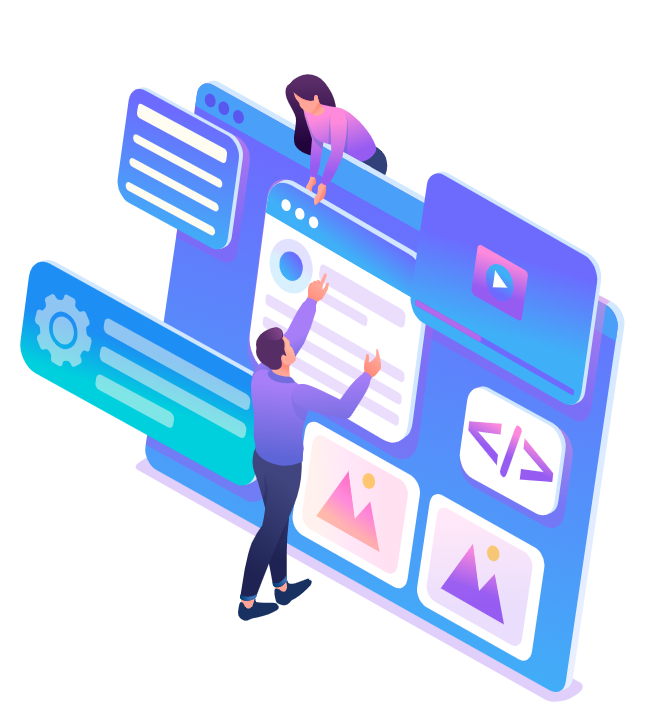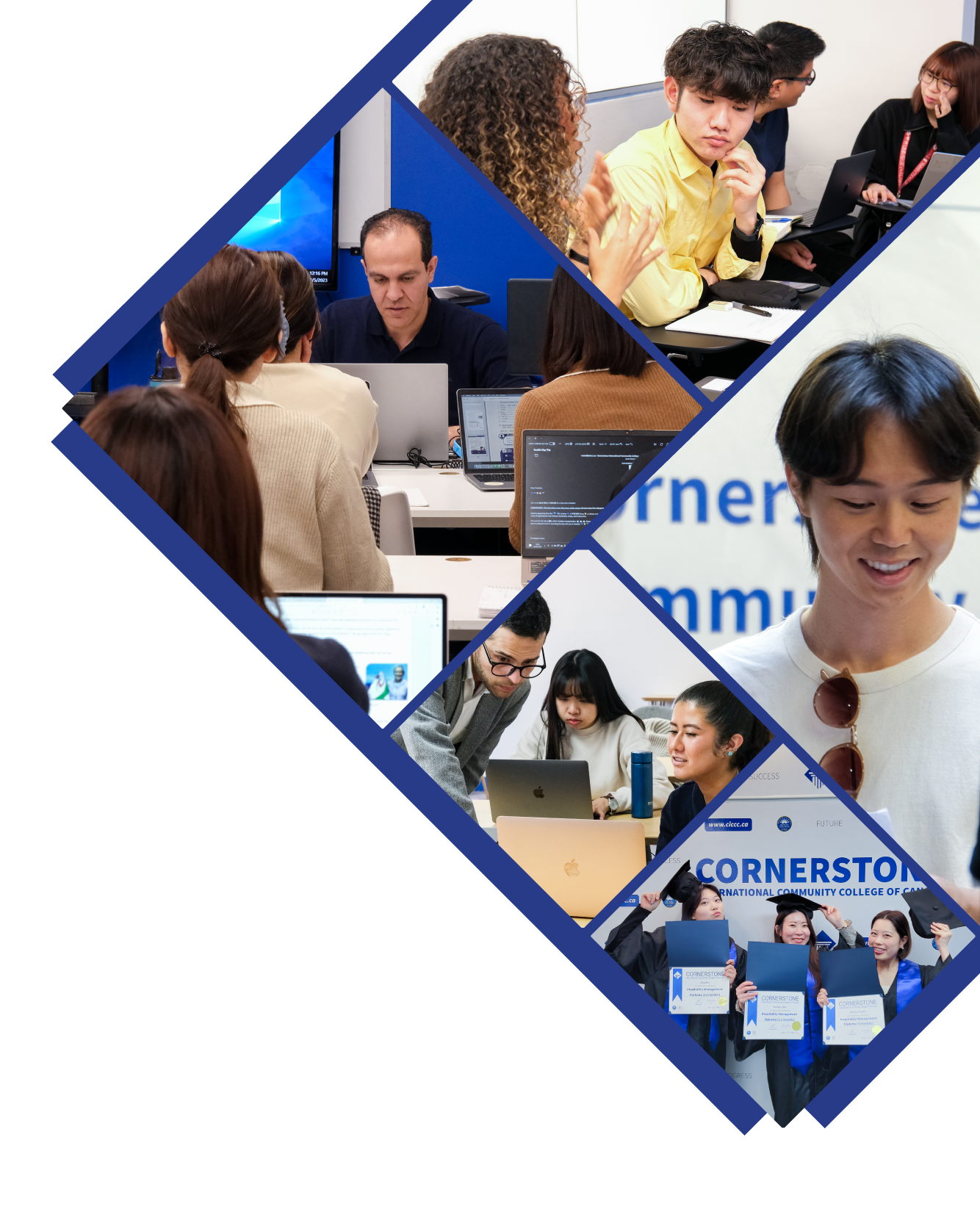Web development consists of designing, crafting, and maintaining websites. In today’s fast-paced business world, having a strong online presence is essential for any company aiming to reach its target audience and achieve success. In this context , web developers play a crucial role, responsible for creating online experiences ranging from basic websites to intricate web applications and e-commerce platforms .
In the Cornerstones’ web development program, students will acquire fundamental concepts and tools, gaining practical knowledge through hands-on classes. Additionally, we offer job placement support to help kick-start their careers as web developers.
Maximize the benefits of this program with our co-op diploma option, seamlessly integrating classroom learning with valuable hands-on work experiences .

DURATION
Academic Education (Part-time Work Permit)
Paid Co-op (Full-time work permit)
Program Overview
The Web Development Program consists of eight courses meticulously crafted to provide you with essential knowledge, practical real-world experience, and vital soft skills required to embark on a fulfilling career as a full-stack developer. Throughout the program, students will delve into the intricacies of back-end and front-end fundamentals, software architecture, databases, and data modeling, as well as component-based design. Additionally, students will gain proficiency in various programming languages, software tools, and frameworks, including JavaScript, CSS, HTML, SQL, MongoDB, Git, Node.js, React.js, and TypeScript.
During the initial three months, students will receive a comprehensive introduction to programming fundamentals. This foundational knowledge is pivotal in equipping them with the skills needed to extract maximum value from the advanced courses that follow later in the program.
Our objective is to shape students into well-prepared professionals ready to enter the job market with confidence. The cornerstone of our approach lies in a hands-on teaching methodology, which serves as the catalyst for the quickest path to becoming a proficient full-stack developer in Canada.

This course aims to initiate students into the dynamic realm of web development, offering a comprehensive exploration of fundamental concepts, skills, and tools within the fields of computer science and technology. The curriculum spans from operational systems to a diverse array of programming languages and their respective platforms, providing a holistic understanding of the ever-expanding landscape of web development.
This practical web development course serves as an introductory exploration of HTML5 and CSS3, establishing a robust foundation for subsequent courses.
Moreover, the curriculum encompasses the JavaScript programming language, information architecture, web form interaction, UI/UX web design concepts, and web analytics. Additionally, students will delve into essential topics such as File Transfer Protocol (FTP) software and adherence to World Wide Web Consortium (W3C) standards.
Building on the foundation established in Web Development I, this course propels students further into honing their HTML5 and CSS3 programming skills. Emphasis will be placed on leveraging multiple frameworks to enhance website functionality and elevate user experience.
Specifically, the curriculum will delve into advanced topics, including asynchronous applications, the utilization of APIs, and proficiency in JQuery. This progression ensures that students not only deepen their understanding of core technologies but also gain practical expertise in employing frameworks for enhanced web development.
Throughout this course, students will immerse themselves in the concept and application of Object-Oriented Programming (OOP), a programming paradigm centered around the use of objects and classes to structure and manage code, as well as to organize data effectively.
Within the classroom setting, students will gain a comprehensive understanding of key OOP elements, including classes, objects, data types, constructors, methods, flow control, collections, data abstraction, modularity, testing, and debugging. Furthermore, the course will explore the practical applications of specific object-oriented programming concepts, such as encapsulation, inheritance, and polymorphism.
React, a JavaScript library tailored for building user interfaces, takes center stage in this dynamic and hands-on course. Building upon the foundations established in Web Development I and II, students will channel their acquired knowledge to craft fast and modular applications utilizing React, Document Object Model (DOM), JavaScript ES6, JSX, and Redux.
The primary focus of this course is on structuring and developing industry-standard single-page applications.
Node.js stands as a distinctive tool, empowering developers to employ JavaScript for both front-end and back-end development. This cross-platform, open-source server environment enables developers to execute JavaScript code on the server side.
In this comprehensive course, students will leverage their existing skills to construct web applications using Node.js. Beyond that, the curriculum extends to teaching students how to establish their own databases and seamlessly connect them with servers.
Prior to program completion, students will have the unique opportunity to apply their accumulated knowledge and skills by embarking on the creation of a real-world web application.
This culminating course is designed to equip students with invaluable hands-on experience in developing their own product. The process begins with the formulation of a comprehensive project proposal, which undergoes approval. Upon approval, students commence the actual development process, culminating in a final presentation where they showcase their work.
Armed with their newly acquired expertise, program graduates can explore a myriad of roles within the dynamic tech industry. Options include pursuing careers as front-end developers, where they would be responsible for designing and implementing user interfaces, or as back-end developers, focusing on server-side development and proficient database management. Additionally, graduates may opt to delve into opportunities as full-stack developers, combining both front-end and back-end skills to create comprehensive web solutions.
The consistently high and growing demand for web developers in Canada opens up a plethora of employment opportunities for program graduates. They can anticipate fulfilling roles across diverse sectors such as e-commerce, software development, digital marketing, and more.
Cornerstone is committed to supporting its graduates in their transition into the Canadian technology industry by offering job placement assistance. Our aim is to empower them by identifying their unique strengths and preferences, guiding them toward a fulfilling career path.
Upon completion of the program, graduates will have the opportunity to explore various roles, including but not limited to:
It’s worth noting that the average salary for these roles in Canada is approximately $63,572 CAD per year.

** Students are required to have their personal computer
Check what our student’s squad say about us
| SEASON | START DATES |
| Spring | Apr 29th, 2024 |
| Summer | September 3rd, 2024 |
| Winter | January 2nd, 2024 |
A full-stack web developer is someone proficient in both front-end and back-end skills, capable of addressing various challenges in web projects. The steps to becoming a successful full-stack web developer are straightforward:
Absolutely! Web development continues to be a promising career, especially in Canada. Programming serves as the foundation for our future, making it essential for everyone to grasp the logic behind coding. Enrolling in a Web Development diploma program opens up opportunities to become either a front-end or back-end developer.
No, a programming background is not mandatory for this program. The curriculum is designed to teach the fundamentals of coding from the ground up. However, prospective students should be prepared to invest a significant amount of effort to successfully complete the courses. While not a prerequisite, having some familiarity with programming logic before starting the program is highly recommended to enhance the learning experience.
Absolutely! Our specialized co-op team actively organizes work events and workshops exclusively for students enrolled in the Web Development program. Notably, students have the opportunity for personalized one-on-one sessions to review their resumes and prepare for job interviews.
Certainly! Students enrolled in the Web Development Diploma Program have the flexibility to attend classes through online sessions. For those who prefer an in-person learning experience, our classrooms are also available. There are no restrictions on taking web development courses either online or in person, provided that students actively participate in the sessions. This flexibility ensures that learners can choose the mode of instruction that best suits their preferences and circumstances.
The duration to become a web app developer varies for each student, depending on individual commitment and effort. Our program is designed to provide comprehensive core knowledge during the academic period, allowing students to enhance their skills. The pace of improvement depends on the time and dedication invested by each student on a daily basis. The more time and effort you allocate to your studies, the faster you are likely to progress on your journey to becoming a proficient web developer in Canada.
The earnings during the co-op period depend on personal, communication, and industry-related skills. In the Web Development Diploma Co-op program, students typically earn 22.45 CAD per hour. However, individual earnings may vary based on factors such as negotiation skills, job responsibilities, and the specific industry demands.
Absolutely! The co-op work as part of the Web Development Diploma program is a paid opportunity. This ensures that students not only gain valuable hands-on experience but are also compensated for their contributions to the industry. Additionally, students have the option to volunteer during their academic sessions to further enhance their industry exposure and skills.
No, high-level math skills are not required for this program. Whether in mobile application courses or web development courses, you will not encounter complicated math questions.